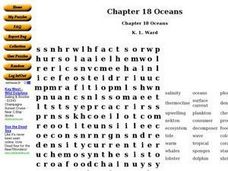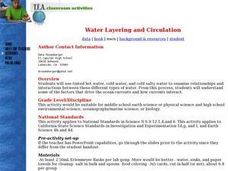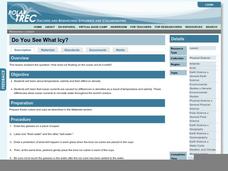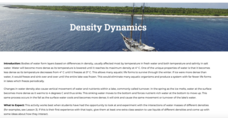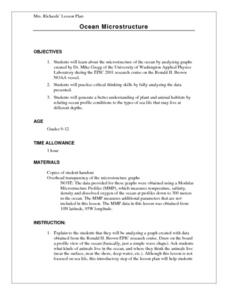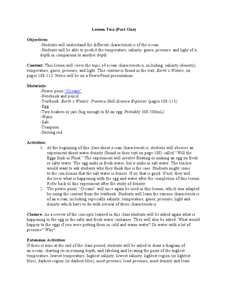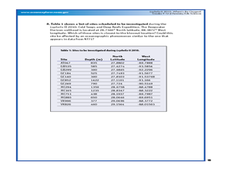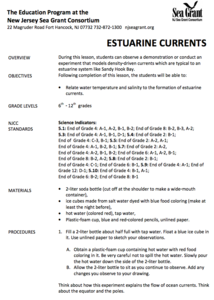Curated OER
Chapter 18 Oceans
In this earth science learning exercise, students identify and locate various vocabulary terms pertaining to the ocean and living things found in the ocean. There are 27 ocean terms located in the word search.
Curated OER
Water Layering and Circulation
Students examine relationships and interactions between different types of water. They experiment with colored water of different temperature and salinity and discuss how the results relate to real ocean currents.
Curated OER
Sea Water Freeze
Students observe how salinity affects the time it takes water to freeze. They participate in an experiment to determine that ice is essentially salt-free whether formed from fresh or salt water
Polar Trec
Do You See What Icy?
Here is a lesson plan that kicks off with a question. "How does ice floating on the ocean act as it melts?" As learners investigate this natural phenomenon, they'll discover that it has a lot to do with temperature, salinity, and the...
Curated OER
Density Dynamics
Students set up working models demonstrating lake turnover and the formation of deep water masses in the oceans.
Curated OER
Water Quality Monitoring
Learners comprehend the four parameters of water quality. They perform tests for salinity, dissolved oxygen, pH and clarity or turbidity. Students comprehend why scientists and environmental managers monitor water uality and aquatic...
Curated OER
Density Stratification and Ocean Circulation
Students examine how circulation currents of the ocean. They use a tub of hot and cold water to demonstrate the currents. They discover how salinity and temperature of water affect its movement.
Curated OER
Water Density
Students identify and analyze the concept of density using the formula, density equals mass divided by volume. They review the differences in salinity levels of the ocean and note that the changes in density are caused by wind and...
Alabama Learning Exchange
The Composition of Seawater
Young scholars explore the concept of finding the composition of seawater. In this finding the composition of seawater instructional activity, students make a saturated salt water solution. Young scholars discuss why there is...
Curated OER
Ocean Microstructure
Students assess the ocean's microstructure by analyzing graphs created during tne Ronald H.Brown research cruise. they discuss at what depths various sea animals live and write paragraphs on data analysis from the graphs.
Curated OER
Saltwater Science
Students conduct an experiment that shows them how salt water allows things to float. In this salt water lesson plan, students mix ingredients together to create salt water and observe how it makes the oceans dense. They then interpret...
Curated OER
Exploring the Aral and Salton Seas
Students investigate the environments of the Aral and Salton Seas. They use images taken from the space shuttle, the U2 spy planes, and remote sensing satellites to learn more about what is happening in each region. Students discuss the...
Curated OER
Lesson tow
Students study the ocean and its characteristics. In this oceans instructional activity students complete a lab activity and are able to predict temperature of certain depths.
Curated OER
Where's the Oxygen?
Students study seawater and how temperature and salinity influence it. In this oxygen lesson students complete a lab activity on dissolved oxygen.
Centers for Ocean Sciences
Ocean and Great Lakes Literacy: Principle 1
Is your current lesson plan for salt and freshwater literacy leaving you high and dry? If so, dive into part one of a seven-part series that explores the physical features of Earth's salt and freshwater sources. Junior hydrologists...
Curated OER
A Funny Taste
Students participate in a demonstration that illustrates the relative amounts of salt in various bodies of water including the Dead Sea, Sallt Lake, Ocean water and distilled water. They taste and compare various mixtures.
Curated OER
Biocomplexity Lab Activity: Creating Salt Water
The instructional activity seeks to intorduce to students the properties of salt water and how to create salt water. Teacher gives backgound information about salt water to students. From that point, students dscuss what elements are...
Curated OER
Ocean Water and Life
In this ocean water and life activity, learners match the vocabulary term with the correct definition. Also, students answer questions by deciding if the statements are true or false. Finally, learners complete concepts maps while using...
Curated OER
Hot, Cold, Fresh and Salty
Students observe the effects of layering water and what is more or less saline than normal. In this geoscience lesson students create saline solutions, layer them and observe how the water becomes different temperatures in different layers.
NOAA
Ocean Layers II
Now that you know the ocean has layers, let's name them. The seventh installment of a 23-part NOAA Enrichment in Marine sciences and Oceanography (NEMO) program covers terminology associated with ocean layers, such as thermocline and...
Curated OER
What is an Estuary?
Students define the terms estuary and watershed. They conduct an experiment to determine the density differences between fresh and saltwater. They examine the salinity distribution of the Peconic Bay Estuary.
Curated OER
Estuarine Currents
Students experiment observing a demonstration on models of density-driven currents which are typically found in an estuarine system of water flow. They compare/contrast water temperature and salinity to the formations of estuarine currents.
Curated OER
The Effects of Storms
An excellent way to review a chapter or unit on storms, this activity features vocabulary review (gust, evacuation, storm surge, salinity), concept review (effects and details about hurricanes), skills/process review (normal high tide...
Curated OER
Currents: Bad for Divers; Good for Corals
Young scholars describe, compare, and contrast major forces that drive ocean currents. They discuss the general effects of topography on current velocity. They discuss how velocity affects the ability
